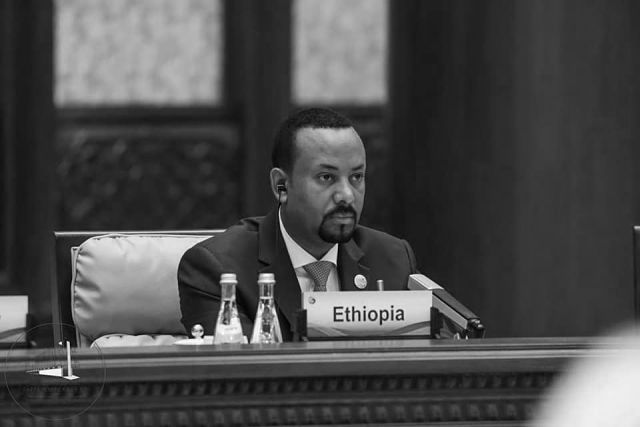 In the following timely editorial the Financial Times newspaper urges PM Abiy Ahmed to continue to trust his instincts, which have been mostly right, and to remain steadfast on his much needed political and economic reforms despite the recent violence and the ethnocentric opposition to his leadership. "But like Yugoslavia after the death of General Josip Tito in 1980, it is not clear the centre can hold," FT points out. "The newly freed press is awash with ethnic slurs and direct attacks on Mr Abiy...It would be a tragedy for the whole continent if it fails." (Photo: PM Abiy's Facebook)
In the following timely editorial the Financial Times newspaper urges PM Abiy Ahmed to continue to trust his instincts, which have been mostly right, and to remain steadfast on his much needed political and economic reforms despite the recent violence and the ethnocentric opposition to his leadership. "But like Yugoslavia after the death of General Josip Tito in 1980, it is not clear the centre can hold," FT points out. "The newly freed press is awash with ethnic slurs and direct attacks on Mr Abiy...It would be a tragedy for the whole continent if it fails." (Photo: PM Abiy's Facebook)
Ethiopia’s Abiy should stick to his liberal instincts
The country can blaze a developmental path, but only if it can hold together
Ethiopia, whose economy has grown at near-double digits for 15 years, is one of the most optimistic stories in Africa. Abiy Ahmed, who became prime minister last year, is one of the continent’s most exciting leaders. But the fragility of Africa’s second most populous country became apparent last week with shootings of a regional president and the military’s chief of staff that the administration has portrayed as an attempted regional coup.
Much is riding on Mr Abiy’s ability to withstand such challenges and pursue his vision of a nation that can both be free and open and deliver the development goals needed to lift the living standards of 105m people. It is troubling, then, that Ethiopia feels constantly as though it is about to derail.
Mr Abiy was chosen as prime minister last April in an effort by the Ethiopian People’s Revolutionary Democratic Front, a coalition of four ethnically constituted parties, to quell a political crisis. The EPRDF had overseen strong growth and gains in health and education, becoming a darling of international donors. But it had stoked ethnic tension both through a constitution that defined the country’s nine regions in ethnic terms and through the perception that the administration was secretly run by a clique of Tigrayans, who make up just 6 per cent of Ethiopia’s population.
The EPRDF had maintained order through a tightly controlled security state, suppressing demonstrations and banning political parties. Mr Abiy, who comes from Oromia, the centre of anti-government protests, has unpicked much of that. He has released prisoners and unbanned political parties, even ones that had previously taken up arms. He has proposed multi-party elections for 2020.
But like Yugoslavia after the death of General Josip Tito in 1980, it is not clear the centre can hold. The newly freed press is awash with ethnic slurs and direct attacks on Mr Abiy. Land grabs and disputes between regions have displaced at least 2m people. Mr Abiy, greeted by many as a national saviour during his first months in office, finds himself attacked from all sides as both an “Ethiopian nationalist”, trampling on jealously-guarded regional rights, and a leader too weak to stop revolt.
In the aftermath of last month’s shootings, Mr Abiy must decide whether to claw back the freedoms he has instituted or press ahead with his liberal agenda. Within reason, he should choose the latter. True, more may need to be done to outlaw hate speech and to stop those who are attempting to whip up violence between ethnic groups. It is true, too, that Mr Abiy will have to think long and hard about whether next year’s promised elections are still feasible, given the political unrest and lack of preparation. In the long run, a form of new federal settlement needs to be worked out that can both guarantee the autonomy of regions — whether ethnically based or not — while pursuing a national agenda.
For the most part, though, Mr Abiy’s instincts have been right. He should attempt to maintain the country’s impressive economic performance not through force but through persuasion that Ethiopia is stronger united than divided. The state’s grip should be loosened, including through the gradual and careful liberalisation of the economy. Ethiopia, almost alone among the populous countries of sub-Saharan Africa, has a chance to blaze a developmental path and achieve the middle-income status that successive leaders have held up as a goal. It would be a tragedy for the whole continent if it fails.
—
Related:
Ethiopia Coup Attempt Heightens Risk of Violent Balkan-style Split
Internet Being Restored in Ethiopia
The Biggest Displacement Crisis That Almost No One Is Talking About
Ethiopian Diplomat: ‘Power in Ethiopia to Come Through Voting, Not Violence’
Q&A: The Current Ethiopia Situation
Killings and Claims of an Attempted Coup Rock Ethiopia
An Emotional Memorial for Slain Military Chief in Ethiopia
UPDATE: Plotter of Failed Ethiopia Coup Killed
The PM’s spokeswoman gives details of army chief’s assassination
Watch: Government says rebellion quashed
Ethiopia says coup attempt thwarted, military chief killed (AP)
Ethiopia says coup attempt in Amhara region has failed (CNN)
Join the conversation on Twitter and Facebook.

























